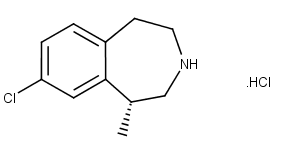Lorcaserin HCl CAS NO 846589-98-8 Inquire about Lorcaserin HCl
Tecoland supplies Lorcaserin HCl bulk active pharmaceutical ingredient (API) to the pharmaceutical industry. Our Lorcaserin HCl is manufactured by cGMP compliant facility. Welcome to contact us for further details including current DMF status for the product and up to date regulatory status of the manufacturing facility. We look forward to assisting you with your research and development projects.
What is Lorcaserin?
Lorcaserin, currently marketed under the trade name Belviq and previously Lorqess during development, is a weight-loss drug developed by Arena Pharmaceuticals. It reduces appetite by activating a type of serotonin receptor known as the 5-HT2C receptor in a region of the brain called the hypothalamus, which is known to control appetite. Lorcaserin is used long term for weight loss in those who are obese.
Pharmacokinetics:
It targets multiple WT and mutated kinases that, when activated, constitutively stimulate aberrant signalling cascades that lead to malignancies such as AML and ASM. Alternative pharmacodynamic effect of midostaurin in prolonging QTc intervals was not clinically significant in patients with advanced SM or AML when compared to placebo. Midostaurin is therapeutically beneficial as a combination therapy for patients undergoing chemotherapy.
Pharmacodynamics:
Lorcaserin produced a dose-dependent weight loss over a 12-week period by promoting satiety and decreasing food consumption.
Lorcaserin HCl Side effects:
In December 2012, the US Drug Enforcement Administration proposed classifying lorcaserin as a Schedule IV drug because it has hallucinogenic properties at higher than approved doses and users could develop psychiatric dependencies on the drug. On 7 May 2013, the US Drug Enforcement Administration classified lorcaserin as a Schedule IV drug under the Controlled Substances Act.There has been concern that lorcaserin can cause cardiac valvulopathy based upon the reports of subjects taking the drug in Phase 2 trials. However, a Phase 3 clinical trial of the drug was conducted and the results published in the October 2014 Postgraduate Medicine journal, a peer-reviewed medical journal for physicians. These results found no statistically significant differences in valvulopathy rates compared to control, being 2.4% for the drug subjects and 2.0% for controls.
Disclaimer:
Information on this page is provided for general information purposes. You should not make a clinical treatment decision based on information contained in this page without consulting other references including the package insert of the drug, textbooks and where relevant, expert opinion. We cannot be held responsible for any errors you make in administering drugs mentioned on this page, nor for use of any erroneous information contained on this page.